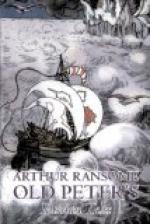All the time he was doing this Vanya and Maroosia were snuggling together close by the stove, thinking what story they would ask for, and listening to the crashing of the snow as it fell from the trees outside. Now that old Peter was at home, the noise made them feel comfortable and warm. Before, perhaps, it made them feel a little frightened.
“Well, little pigeons, little hawks, little bear cubs, what is it to be?” said old Peter.
“We don’t know,” said Maroosia.
“Long hair, short sense, little she-pigeon,” said old Peter. “All this time and not thought of a story? Would you like the tale of the little Snow Girl who was not loved so much as a hen?”
“Not to-night, grandfather,” said Vanya.
“We’d like that tale when the snow melts,” said Maroosia.
“To-night we’d like a story we’ve never heard before,” said Vanya.
“Well, well,” said old Peter, combing his great gray beard with his fingers, and looking out at them with twinkling eyes from under his big bushy eyebrows. “Have I ever told you the story of ’The Silver Saucer and the Transparent Apple’?”
“No, no, never,” cried Vanya and Maroosia at once.
Old Peter took a last pull at his pipe, and Vanya and Maroosia wriggled with excitement. Then he drank a sip of tea. Then he began.
THE TALE OF THE SILVER SAUCER AND THE TRANSPARENT APPLE.
There was once an old peasant, and he must have had more brains under his hair than ever I had, for he was a merchant, and used to take things every year to sell at the big fair of Nijni Novgorod. Well, I could never do that. I could never be anything better than an old forester.
“Never mind, grandfather,” said Maroosia.
God knows best, and He makes some merchants and some foresters, and some good and some bad, all in His own way. Anyhow this one was a merchant, and he had three daughters. They were none of them so bad to look at, but one of them was as pretty as Maroosia. And she was the best of them too. The others put all the hard work on her, while they did nothing but look at themselves in the looking-glass and complain of what they had to eat. They called the pretty one “Little Stupid,” because she was so good and did all their work for them. Oh, they were real bad ones, those two. We wouldn’t have them in here for a minute.
Well, the time came round for the merchant to pack up and go to the big fair. He called his daughters, and said, “Little pigeons,” just as I say to you. “Little pigeons,” says he, “what would you like me to bring you from the fair?”
Says the eldest, “I’d like a necklace, but it must be a rich one.”
Says the second, “I want a new dress with gold hems.”
But the youngest, the good one, Little Stupid, said nothing at all.
“Now little one,” says her father, “what is it you want? I must bring something for you too.”




